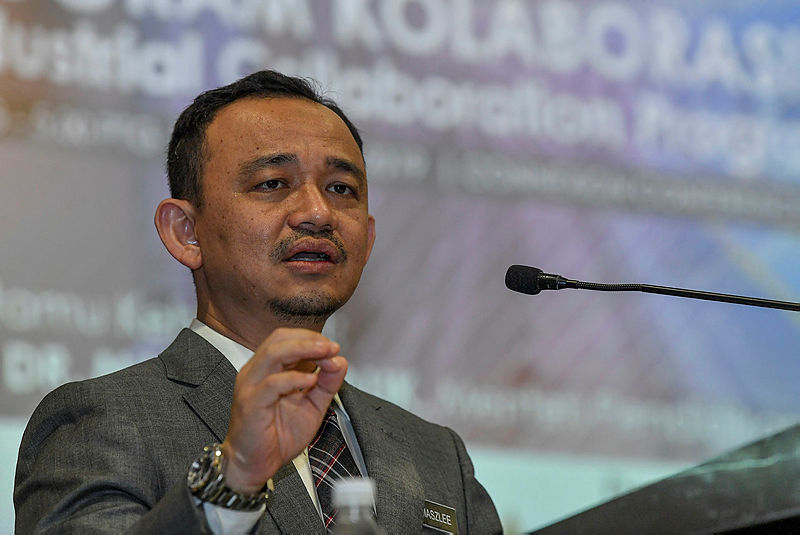KUALA LUMPUR: Strengthening the education sector remains the government’s priority, as was evident when the Education Ministry emerged as the biggest recipient of Budget 2019, enabling more changes and improvements to be made to enhance the quality of education in the country.
With an allocation of RM60.2 billion, or 19.1% of the government’s RM314.5 billion budget, the ministry, helmed by Dr Maszlee Malik (pix), has outlined five focus areas for major changes in education with 53 reform initiatives.
As Prime Minister Tun Dr Mahathir Mohamad has said, “the rise and fall of a race lie in the hands of teachers”, the ministry has focused on the issue of burden of teachers by implementing five initiatives and nine interventions to address this matter since January this year.
The transformation implemented included facilitating the management of file and documentation, data management and online systems, giving teachers the freedom to devise the implementation of Literacy and Numeracy (Linus) appropriate to the needs of students and approving the transfer of 15,565 unhappy teachers.
In addition, to further improve the quality of national education and to prepare students to meet the challenges of the future, especially the Industrial Revolution 4.0 (IR4.0), the ministry has also made changes by abolishing the streaming of arts and science for Form Four next year.
This abolition is in line with the implementation of the Standard-Based Curriculum for Secondary Schools (KSSM) in stages involving Form One students in 2017 as the first cohort who will be in Form Four in 2020.
Through the implementation of KSSM, which replaced the Secondary School Integrated Curriculum (KBSM), two subject packages are offered to students, namely Science, Technology, Engineering & Mathematics (STEM), and Literature & Humanities.
The continuous changes implemented by the ministry over the past year also began to bear fruit when five Malaysian universities have improved their rankings in the Quacquarelli Symonds (QS) Asia University Rankings (QS-AUR) 2020.
Universiti Malaya (UM) has climbed to the 13th spot from 19th last year, Universiti Putra Malaysia (UPM) to 33rd from 34th, Universiti Sains Malaysia to 37th from 43rd, Universiti Kebangsaan Malaysia to 39th from 41st, Universiti Teknologi Mara to 40th from 47th, and Universiti Teknologi Petronas to 82nd from 99th.
The result proves that the government is on the right track in providing quality higher education institutions towards the era of IR4.0.
Instead of just producing a competitive and intelligent generation, the Education Ministry has re-introduced the Civics subject in schools beginning June to ensure that young Malaysians have high values, ethics and integrity, thus creating a responsible, caring and civic-minded society.
The year 2019 also saw the ministry announcing that Jawi and khat writing will be introduced into the Bahasa Melayu subject for Year 4 pupils at national-type Chinese (SJKC) and Tamil (SJKT) schools next year.
The move, however, received mixed reactions, including protests from 12 Chinese and Tamil education groups such as the United Chinese School Committees’ Association of Malaysia (Dong Zong), which claimed that the introduction of khat writing for these schools does not meet the real needs of learning Bahasa Melayu.
Although many experts have said the introduction of Jawi calligraphy is to learn from the aspects of history and heritage, these groups remained adamant and opposed the implementation.
The Cabinet then decided that khat lessons be renamed introduction to Jawi writing and will be introduced as an optional at the basic level for Year 4 pupils starting from 2020, Year 5 pupils starting from 2021, and Year 6 pupils starting from 2022 in vernacular schools.
The Cabinet also decided it will only be carried out if it has been agreed to by the Parent-Teacher Association (PIBG) as well as parents and students of the vernacular school concerned.
The introduction to Jawi writing would be allocated three pages in the textbook, although there would not be any test or examination on it.
Meanwhile, the issue on the distribution of the comic book titled ‘Belt and Road Initiative for Win Winism’ to educational institutions including schools also became a controversy.
The comic book, which allegedly contains communist propaganda, was seen as not suitable for students’ reading and was criticised by netizens and became a topic of debate among MPs in Parliament.
Maszlee explained that the Ministry of Education did not endorse the distribution of the comic book to educational institutions including schools and had ordered the Education Department to ensure that all schools do not accept and distribute the books.
The Ministry of Education wound up the year by becoming the first ministry to present its ‘report card’ for 2019.
On Dec 13, Maszlee presented his ministry’s achievements themed “Education for All”, which saw the ministry closing the year with five major changes focusing on its 53 reform initiatives in the national education system. — Bernama














